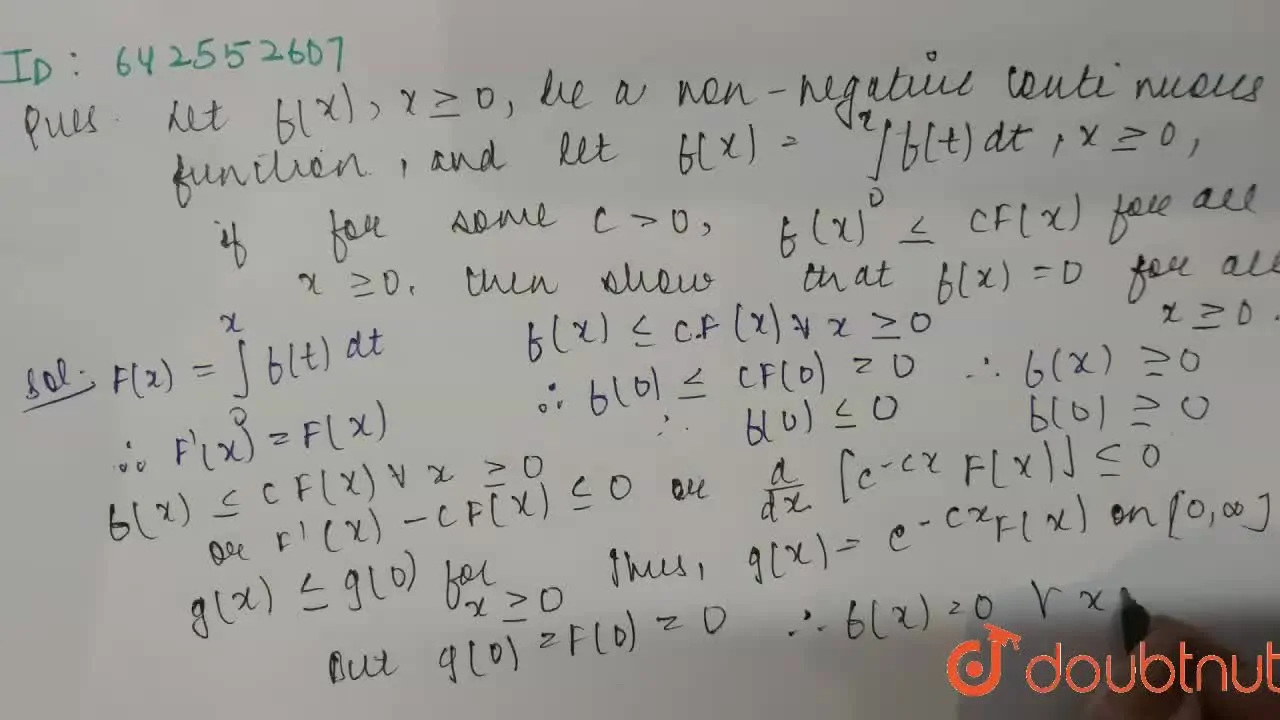Let f(x),x≥0, be a non-negative continuous function, and let f(x)=∫x0f(t)dt,x≥0, if for some c>0,f(x)≤cF(x) for all x≥0, then show that f(x)=0 for all x≥0.
Given that F(x)=∫x0f(t)dt
∴F′(x)=f(x)
Also, given that f(x)≤cF(x)∀x≥0
Also, given that f(x)≤cF(x)∀x≥0
∴f(0)≤cF(0)=0
∴f(0)≤0
But given that f(x) is non-negative function on [0,∞]
∴f(x)≥0
∴f(0)≥0
Thus, from equation (2) and (3), f(0)=0.
Again, f(x)≤cF(x)∀x≥0
or F′(x)−cF(x)≤0
or F′(x)−cF(x)≤0∀x≥0 [using equation] or e−cxF′(x)−ce−cxF(x)≤0 [multiplying both sides by e−cx. I.F)
or ddx[e−cxF(x)]≤0
Thus,g(x)=e−cxF(x) is a decreasing function on [0,∞] i.e.,
g(x)≤g(0) for all x≥0
But g(0)=F(0)=0
∴g(x)≤0∀x≥0
or e−cxF(x)≤0∀x≥0
or f(x)≤cF(x)≤0∀x≥0[∴c>0 and using f(x)≤cF(x)]
or f(x)≤0∀x≥0
But given f(x)≥0
∴f(x)=0∀x≥0
Related Playlists
- BOOK - CENGAGE ENGLISHCHAPTER - DIFFERENTIAL EQUATIONSEXERCISE - CONCEPT APPLICATION EXERCISES 10.16videos
DIFFERENTIAL EQUATIONS
- BOOK - CENGAGE ENGLISHCHAPTER - DIFFERENTIAL EQUATIONSEXERCISE - CONCEPT APPLICATION EXERCISES 10.26videos
DIFFERENTIAL EQUATIONS
- BOOK - CENGAGE ENGLISHCHAPTER - DIFFERENTIAL EQUATIONSEXERCISE - Matrix Match Type5videos
DIFFERENTIAL EQUATIONS
- BOOK - CENGAGE ENGLISHCHAPTER - DIFFERENT PRODUCTS OF VECTORS AND THEIR GEOMETRICAL APPLICATIONS EXERCISE - Multiple correct answers type11videos
DIFFERENT PRODUCTS OF VECTORS AND THEIR GEOMETRICAL APPLICATIONS
- BOOK - CENGAGE ENGLISHCHAPTER - DIFFERENTIATIONEXERCISE - Archives14videos
DIFFERENTIATION
Similar Questions
Let f(x),x≥0, be a non-negative continuous function. If f′(x)cosx≤f(x)sinx∀x≥0, then find f(5π3)
View SolutionA continuous function f(x) satisfies the relation f(x)=ex+∫10exf(t)dt then f(1)=
View SolutionLet fandg be differentiable on R and suppose f(0)=g(0)andf′(x)≤g′(x) for all x≥0. Then show that f(x)≤g(x) for all x≥0.
View SolutionLet fandg be differentiable on R and suppose f(0)=g(0)andf′(x)≤g′(x) for all x≥0. Then show that f(x)≤g(x) for all x≥0.
View SolutionLet f(x) be a non-positive continuous function and F(x)=∫x0f(t)dt∀x≥0 and f(x)≥cF(x) where c<0 and let g:[0,∞)→R be a function such that dg(x)dx<g(x)∀x>0 and g(0)=0
The number of solution(s) of the equation
∣∣x2+x−6∣∣=f(x)+g(x) is/areView SolutionLet f(x) be a non-positive continuous function and F(x)=∫x0f(t)dt∀x≥0 and f(x)≥cF(x) where c<0 and let g:[0,∞)→R be a function such that dg(x)dx<g(x)∀x>0 and g(0)=0
The total number of root(s) of the equation f(x)=g(x) is/ areView SolutionLet f(x) be a non-positive continuous function and F(x)=∫x0f(t)dt∀x≥0 and f(x)≥cF(x) where c<0 and let g:[0,∞)→R be a function such that dg(x)dx<g(x)∀x>0 and g(0)=0
The solution set of inequation g(x)(cos−1x−sin−1)≤0View SolutionLet f(x) be a non negative continuous and bounded function for all x≥0 .If (cosx)f(x)<(sinx−cosx)f(x)∀x≥0, then which of the following is/are correct?
View SolutionLet f(x) be a differentiable function such that f(x)=x2+∫x0e−tf(x−t)dt then ∫10f(x)dx=
View SolutionLet: f:[0,3]→R be a continuous function such that ∫30f(x)dx=3. If I=∫30(xf(x)+∫x0f(t)dt)dx, then value of I is equal to
View Solution


